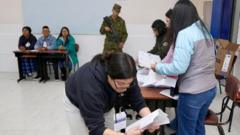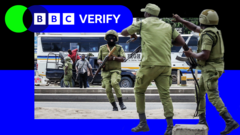Will Ecuador's Vote Against Foreign Military Bases Change Its Defense Strategy?

Published: 2025-11-17 04:00:28 | Category: technology
The recent referendum in Ecuador has seen voters decisively reject the return of foreign military bases, particularly frustrating US ambitions for expanding its military presence in the Eastern Pacific region. The outcome represents a significant setback for President Daniel Noboa, who argued that foreign military support was essential to combat the escalating violence linked to drug trafficking in the country.
Last updated: 28 October 2023 (BST)
What’s happening now
The refusal to reinstate foreign military bases in Ecuador has immediate implications for both national security and international relations. President Noboa had campaigned for this change, suggesting that it would bolster Ecuador's fight against organised crime, particularly as the country grapples with a surge in violence exacerbated by its geographical proximity to Colombia and Peru—two major cocaine-producing nations. The US, which had its military presence in Ecuador curtailed in 2008, viewed the referendum as a potential pathway to re-establishing a base that could enhance regional security operations.
Key takeaways
- Ecuadorians voted against allowing foreign military bases, thwarting US military expansion plans.
- President Noboa's push for military support was linked to rising violence and drug trafficking.
- The referendum also saw voters reject proposals to reform political funding and the size of Congress.
Timeline: how we got here
The situation surrounding foreign military bases in Ecuador has evolved significantly over the years:
- 2008: The Ecuadorian legislature passes a constitutional ban on foreign military bases, leading to the closure of the US base on the Pacific coast.
- 2021: Rafael Correa's legacy continues to influence political discourse regarding military presence and security.
- October 2023: A referendum is held, resulting in a decisive no vote against the return of foreign military bases, along with other proposed constitutional changes.
What’s new vs what’s known
New today/this week
The referendum's outcome is a clear indication of public sentiment against foreign military intervention, reflecting a broader desire for national sovereignty. Voters have also expressed skepticism towards Noboa’s broader constitutional reforms aimed at tackling crime and insecurity.
What was already established
Prior to the referendum, President Noboa had been advocating for foreign military assistance, citing the growing threat from drug-trafficking groups like Los Lobos. His administration's tough stance on crime has been met with mixed reactions, with supporters praising military crackdowns, while critics raise concerns over authoritarian tactics.
Impact for the UK
Consumers and households
For UK consumers, the repercussions of Ecuador's decision may be felt indirectly through the global drug trade's impact on prices and supply chains, especially concerning South American cocaine. The instability in Ecuador could also affect regional trade routes and security, potentially leading to wider implications in international markets.
Businesses and jobs
Businesses operating in or around Ecuador may face uncertainty regarding safety and stability, particularly those in sectors that are vulnerable to crime. The lack of military support may hinder efforts to combat organised crime, affecting local economies and employment opportunities.
Policy and regulation
The UK government may need to reassess its foreign policy in the Americas, particularly in terms of security cooperation and drug trafficking. The situation in Ecuador might influence discussions on how the UK addresses regional security issues and collaborates with other nations to tackle drug-related crime.
Numbers that matter
- 70%: Percentage of the world's cocaine that reportedly passes through Ecuador, according to President Noboa.
- 16 years: Time since the US was forced to close its military base in Ecuador, marking a significant shift in military presence.
- 83: Number of fatalities reported from US strikes on alleged drug-trafficking vessels in the Eastern Pacific and Caribbean.
Definitions and jargon buster
- Los Lobos: A prominent drug-trafficking gang in Ecuador, designated as a terrorist organisation.
- Narco-trafficking: The illegal trade of drugs, particularly cocaine, often involving complex international networks.
- Constitutional assembly: A body convened to draft or revise a constitution, often reflecting significant political change.
How to think about the next steps
Near term (0–4 weeks)
The immediate aftermath of the referendum will likely see President Noboa reassessing his strategy in combating organised crime and addressing public concerns regarding violence without foreign military support.
Medium term (1–6 months)
In the coming months, Noboa’s administration may propose alternative strategies to address crime, focusing on local law enforcement and community-based solutions rather than reliance on foreign military assistance.
Signals to watch
- Public opinion polls regarding security and crime management in Ecuador.
- Developments in regional cooperation agreements between Ecuador and neighbouring countries on drug trafficking.
- Potential shifts in US military strategy in response to the referendum outcome.
Practical guidance
Do
- Stay informed about developments in Ecuador and regional security efforts.
- Monitor government communications regarding changes in law enforcement strategies.
Don’t
- Assume that the absence of foreign military bases will lead to immediate improvements in security.
- Ignore the broader implications of drug trafficking on international relations.
Checklist
- Review updates from Ecuadorian authorities regarding crime statistics.
- Consider how changes in Ecuador’s security landscape may affect global drug trade patterns.
- Stay aware of how international relations in the region evolve following the referendum.
Risks, caveats, and uncertainties
The rejection of foreign military bases does not eliminate the threat posed by drug trafficking; rather, it underscores the complexities of addressing crime in a context where public opinion is deeply divided. Noboa's administration may face challenges in implementing effective domestic policies without foreign assistance, and there are concerns that increasing violence could lead to calls for a change in strategy in the future.
Bottom line
Ecuador's recent referendum highlights the tension between national sovereignty and the need for security in an era of rampant drug trafficking. The decision against foreign military bases signals a desire for autonomy, but it raises questions about how the country will effectively combat escalating crime in the absence of external support.
FAQs
What was the outcome of the Ecuador referendum?
In the recent referendum, Ecuadorians voted against allowing foreign military bases, a significant decision impacting national security and US relations.
Why did President Noboa support foreign military bases?
President Noboa argued that foreign military bases were necessary to combat organised crime and the rising violence linked to drug trafficking in Ecuador.
How does the drug trade affect Ecuador's security situation?
Ecuador's strategic location near major cocaine producers makes it a key transit point for drug trafficking, contributing to increased violence and crime within the country.



